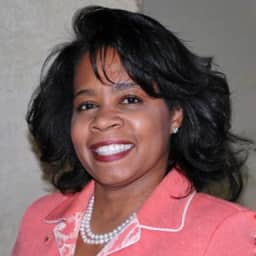
Leslie Thornton
FORMER SENIOR VICE PRESIDENT AND MERGER TRANSITION COUNSEL
WGL HOLDINGS AND WASHINGTON GAS LIGHT COMPANY
WASHINGTON, DC
Leslie Thornton, the recently retired senior vice president and merger transition counsel for WGL Holdings and Washington Gas Light Company, has had the same mandates as most high-profile general counsel. She has navigated and managed major litigation, employment and labor law matters, supported the board of directors, and dealt with complex cybersecurity issues and data protection, all while being cognizant of what that means in the energy industry. The utility service serves the Washington, DC metro area by providing natural gas directly to homes and offices of over one million people in Maryland, Virginia, and the District of Columbia.
In addition to her day job, she has, for the last two years, been chair of the American Gas Association’s Legal Committee where she has helped the association in its advocacy of common sense regulation and best industry practices, as well as overseen the support of her peer GCs in the industry. It illustrates the range, and seriousness, of issues that Thornton has had to navigate.
WGL’s legal department has 18 attorneys and 10 support staff, including paralegals. The department is divided into different groups: regulatory, litigation, corporate transactions, and subject matter experts (such as executive compensation, benefits, ERISA, employment and labor, ethics, etc.). Since Thornton joined WGL in November 2011, she has expanded the department by seven positions, giving her team the ability to do the “vast majority” of the work in-house. Thornton prefers to have the expertise in-house because she believes that a strong in-house team can accomplish more than outsourced staff ever could. She also became WGL’s in-house lead on cybersecurity issues — Thornton received her LLM in national security law with a focus on cybersecurity from Georgetown Law in 2016.
A lot of the WGL’s legal department’s work includes regulatory approvals. Washington Gas is regulated by three public service commissions — Maryland, Virginia, and Washington, DC. When a pipeline needs to be repaired or replaced, Washington Gas’s regulatory lawyers work with the relevant commissions to determine the parameters of infrastructure replacement. Washington Gas is also regulated by the Federal Energy Regulatory Commission (FERC).
As part of her duties, Thornton led the company’s recent US$6.4 billion merger — a process also subject to regulatory approval in two states and the District of Columbia, FERC, the Department of Justice’s Antitrust Division, and the Committee on Foreign Investment (known as CFIUS) because the merger partner, AltaGas, is based in Canada. After 18 months of regulatory proceedings and other related work, the merger was approved, and the WGL is in full integration mode with its parent company. The merger makes WGL a broader company but customers won’t see any brand changes.
Lessons from Mount Airy
Thornton is the daughter of an enterprising entrepreneur father and a bookkeeper mother. She grew up in the Mount Airy neighborhood of Philadelphia, at that time one of the most racially integrated neighborhoods in the nation. She vividly remembers Thanksgiving in the Catskills mountains, where her uncle ran an overnight camp. While her grandmother prepared the meal, Thornton joined her twin sister, her brothers, and many cousins in the yard, playing all kinds of sports.
All the kids in Thornton’s family knew that they would go to college — their mother made it clear that there wasn’t another option. “The drive came from our mother, who was just an incredible person who pushed all of us to go to school,” she reflects, and the hard work and discipline came from her proud father. In junior high school, Thornton read The Throwaway Children, a book about the juvenile justice system in Philadelphia. Written by a judge named Lisa Richette, the book lit a fire in Thornton. “It touched my soul, and I decided I was going to be a lawyer. I was going to right all the wrongs of the juvenile criminal justice system,” she remembers.

The PDS family
At Georgetown, Thornton took every criminal law class possible. She learned that Washington, DC’s public defender service (PDS), at the time led by Charles Ogletree, was legendary. Ogletree, who recently retired from Harvard Law, was a legend in the field, and Thornton set her sights on joining the service. “I didn’t think I was going to get in,” she recalls, “even though I was at a very good school — a top ten law school at the time. Everybody that went there was from Harvard, Stanford, or Yale.” But she got in, describing the experience as “phenomenal.” Thornton joined a class of only 11 people. Nearly a thousand had applied. Before the cohort is allowed anywhere near the courtroom, they’re put through a six-week training course.
It’s a fraternity for life. Decades after leaving the public defender service, Thornton shared emails from PDS alumni who were fêting the PDS lawyer who won the October 2018 Marine Corps Marathon.
Thornton worked at PDS for four years, but
its influence on her proved pivotal. “These jobs require a level of fearlessness in terms of your ability to tackle tough issues and really knowing the law,” she says. “Being grounded in who you are and what your ethos is and what your ethics are: I think those are really important lessons. And working as a team, because PDS is all about working as a team.”
It was the emotional toll of PDS that took Thornton by surprise. One of her last trials was a rape case. She co-tried it with another defender and won an acquittal. But the verdict isn’t what stuck with her. What stuck with her was the sound of the victim’s voice.
After thinking it over, Thornton decided it was time for a change. She joined a criminal and civil litigation firm, known for letting employees wear jeans to work — wild stuff for DC in the late 1980s. The change allowed her to regroup and learn more about white-collar criminal defense, among other specialties. She continued to hone her experience in litigation firms until 1992 when she joined the Office of Presidential Transition and Vice Presidential Transition. Thornton is quick to explain it wasn’t a political role: “I was vetting and doing background searches on cabinet, sub-cabinet, and White House candidates. One of the things I learned right away was the importance of extreme discretion.”
She also learned how to work with coworkers with disparate interests. As chief of staff for the secretary of education, she needed to figure out how to achieve goals when staff wanted to go about it in different ways. In times like these, Thornton found that the best way to achieve things is to stand as an individual — to “stand in your own truth.” It’s only if you know your true self that you can work in that environment, she believes, and trust that the decisions you make are the right ones.
After her experience in the executive branch, she returned to private practice as a partner in DC firms. In 2005, she joined the board of directors of the Career Education Corporation, a then multi-billion-dollar publicly traded education company. The company found her because they were in search of independent directors with higher education experience. Thornton was the youngest board member by at least 15 years. She advises lawyers who are thinking of joining a board to remember their role. “Your job is not to manage the company. It’s to provide oversight and strategic direction,” she stresses. Don’t underestimate the time commitment, she adds. In her first year on the board, there were 75 board meetings because a proxy fight had broken out. Thornton estimates that she spent 600 (unbillable) hours dedicated to the ordeal her first year on the board.
Yet, that experience was one of the things she discussed when she decided to move in-house at WGL in 2011. “It was really additive to my CEO, who was an executive chairman, on what a board member is thinking about management and how board meetings are run,” she says.
Thornton retired from WGL in November 2018, but she hasn’t exited the industry entirely. On November 14, 2018, Southwest Gas Holdings, Inc. announced that it elected her to the company’s board. Thornton will serve on the Audit and Compensation Committees for the company, which provides natural gas to two million customers in Arizona, Nevada, and California. Her cybersecurity expertise was a primary asset for the company.
Overall, Thornton says, in-house lawyers should use the critical skills they honed in law school to see the bigger picture. Being smart, ethical, and hardworking go without saying. She says in-house lawyers should ask themselves, “Outside of my particular expertise, how can I fit into and support the strategic business goals of the organization?” And before it’s time to ask that question, there’s a more basic question to ask: “What does standing in my truth mean?”
Getting to know… Leslie Thornton
WHO IS SOMEONE THAT EXEMPLIFIES LEADERSHIP TO YOU AND WHY?
The first person I think of historically is Martin Luther King, Jr., and I think the why is kind of obvious. In the present day, I would say it’s a number of people. My former CEO was a terrific leader. There are some interesting leadership things going on with the #MeToo movement that you wouldn’t necessarily have thought of. So, I see leaders in a lot of different forms and faces. I felt my mother was a leader of our entire extended family. The thread that runs through all those people for me is a “buck stops here” view of the world. You’re taking responsibility, being accountable, and really having an understanding of the people and the issues that you’re leading. I think those are the things that are most impressive to me. And then obviously, being a little bit of a human being, not taking yourself too seriously.
OUTSIDE OF OFFICE HOURS, WHAT’S YOUR FAVORITE THING TO DO?
I love old live R&B and jazz. So, I go to the Birchmere a lot, which is in Alexandria, Virginia. My whole family and extended family go to the Rehoboth Jazz Festival every year, which I just got back from. And I would say, writing.
WHO IS YOUR FAVORITE MUSICAL ARTIST?
I have a number of those. I would say Luther Vandross, Tower of Power, War, Stephanie Mills … I just aged myself a hundred years. I do like Bruno Mars.
AND WHAT ABOUT WRITING?
I’ve written a novel. It’s sort of politics meets crime meets mystery. I’m going to work on it more after I retire from WGL.




